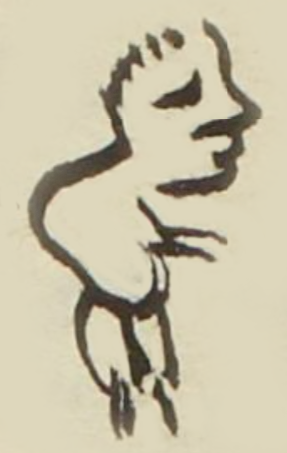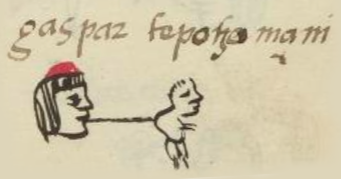Tepotzomani (MH878r)
This black-line drawing of the simplex glyph for the personal name Tepotzomani (perhaps “In the Manner of a Hunchbacked Person”) is attested here as a man’s name. The glyph shows a man standing in profile, facing toward the viewer’s right. His arms (not well defined) reach forward. His legs may have pantaloons, but below the knee they are just sticks with no feet. His back has a hump. His head has tiny short lines for hair, almost non-existent. This person has a handicap. The -mani suffix (in the manner of) is only implied, not shown visually.
Stephanie Wood
Having some kind of physical issue could have been a plus in Nahua culture. Ben Leeming has written about such people as "morally neutral, supernaturally powerful, and ultimately essential members of the Mesoamerican sacred realm." [See: “Big-Old Long Lips, Big-Old Jar Nose": Ancient Mesoamerican Monsters and Clowns and the Transformation of Christianity in Early Colonial Mexico," Ancient Mesoamerica 33:2 (Summer 2022).
Stephanie Wood
gaspar tepotzo mani
Gaspar Tepotzomani
Stephanie Wood
1560
Jeff Haskett-Wood
jorovado, corcovado, hunchbacked, alter-abled, nombres de hombres

tepotzo(tli), a hunchbacked person, https://nahuatl.wired-humanities.org/content/tepotzotli
-mani, in the manner of, https://nahuatl.wired-humanities.org/content/mani-1
A la Manera de una Persona Quejada de Una Joroba
Stephanie Wood
Matrícula de Huexotzinco, folio 878r, World Digital Library, https://www.loc.gov/resource/gdcwdl.wdl_15282/?sp=828&st=image.
This manuscript is hosted by the Library of Congress and the World Digital Library; used here with the Creative Commons, “Attribution-NonCommercial-ShareAlike 3.0 License” (CC-BY-NC-SAq 3.0).








